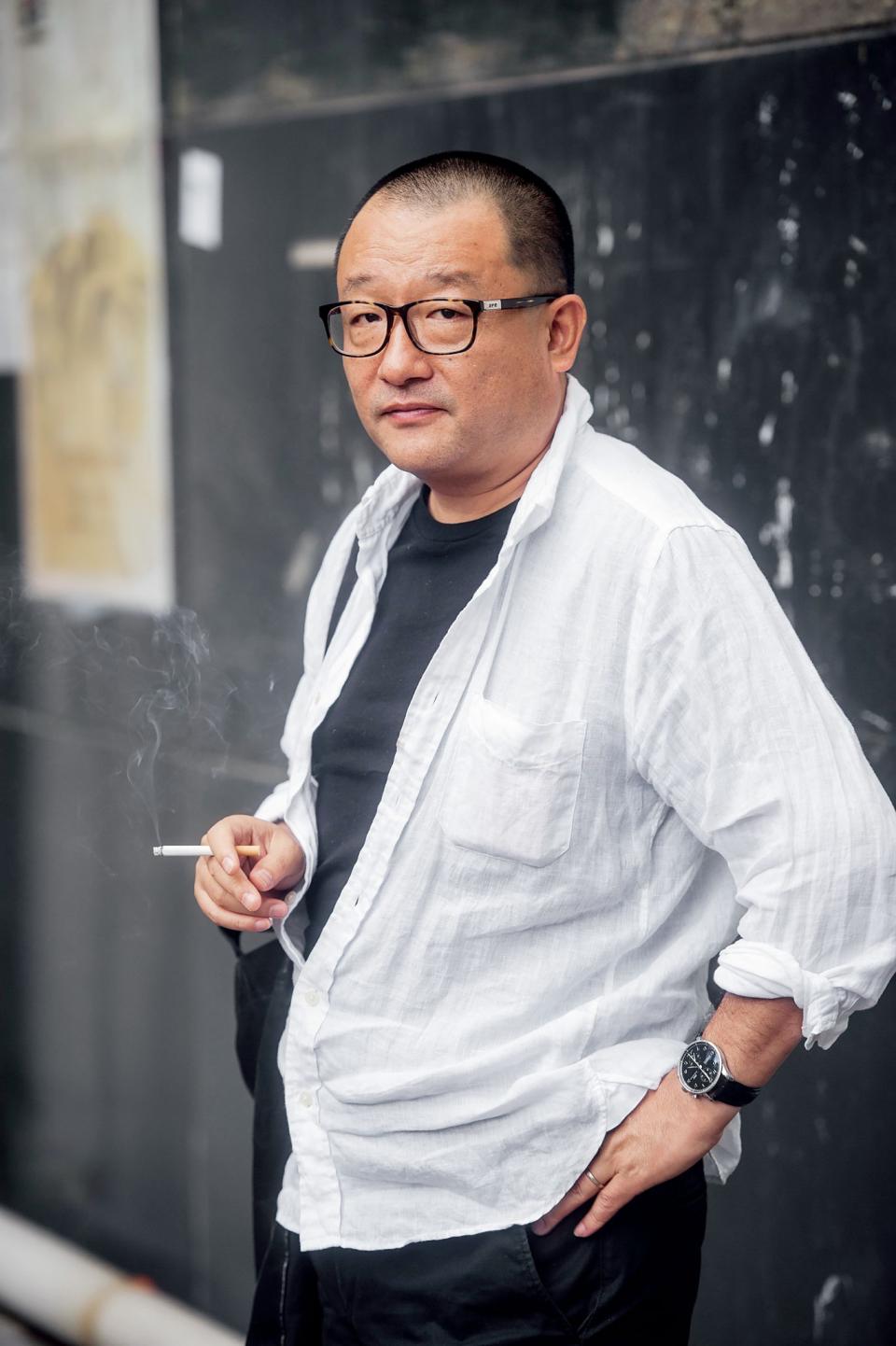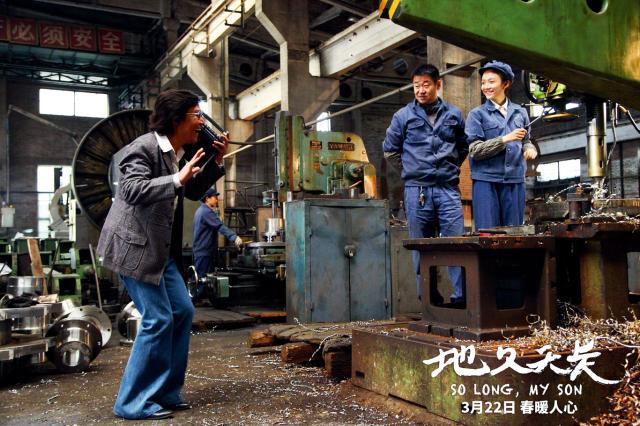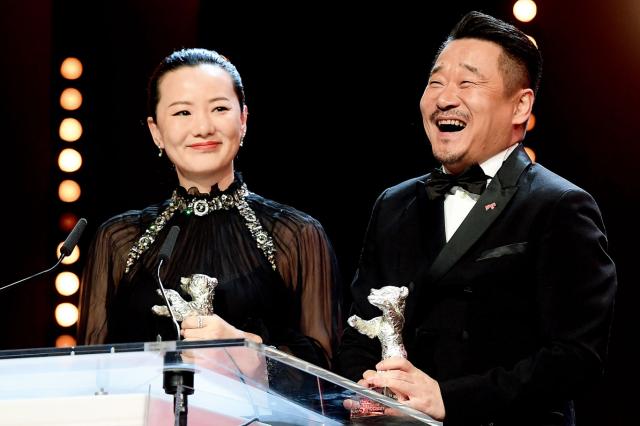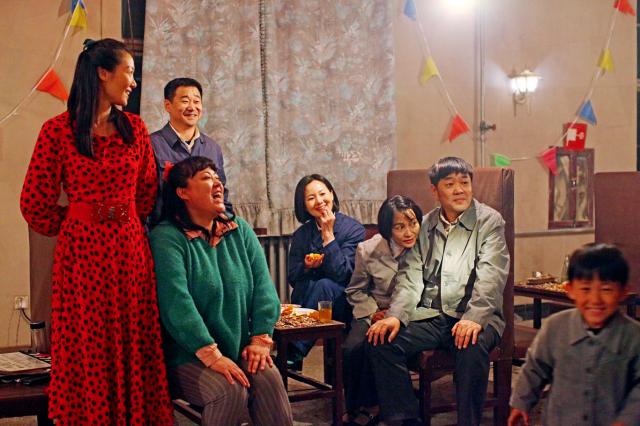Inside Wang Xiaoshuai’s Beijing studio stands a conspicuous shelf full of awards, among which is a prize he received at the International Film Festival Rotterdam for his second feature, Frozen (1995).
On it is inscribed the pseudonym Wu Ming (“no name”) – a nod to his past underground status, his work once banned in China.
Beside it stands another large shelf stuffed with literature and art books. Opposite is a whiteboard covered with actor headshots for an ongoing web drama.
“After all, I have to make some money to feed the arthouse movies,” the 53-year-old director said.
With 11 features under his belt, Wang ranks among Jia Zhangke, Lou Ye and Zhang Yuan as standouts from China’s “Sixth Generation” of directors, many of whom started as independent and underground filmmakers (unlike Zhang Yimou and Chen Kaige of the “Fifth Generation”). Following Frozen, Wang went on to receive the Silver Bear at the 2001 Berlin Film Festival for Beijing Bicycle, the Cannes Jury Prize in 2005 with Shanghai Dreams and another Silver Bear in 2008 for best screenplay with In Love We Trust.
His latest feature So Long, My Son is his most ambitious work to date. The first installment of his promised “Homeland” trilogy, Wang narrates China’s 40 years of economic development and its impacts on ordinary people through the personal stories of two families.
The film was nominated for a Golden Bear at this year’s Berlin International Film Festival, with its leads Wang Jingchun and Yong Mei taking home awards for Best Actor and Best Actress – the first time Chinese actors claimed both awards.
The film is rated 8/10 on leading media review website Douban and 9/10 on the movie ticketing service platform Maoyan. It boldly critiques some of China’s most controversial social issues, including the one-child policy and the massive layoffs of the 1990s. Commentary aside, the film offers shrewd observations on humanity through the guilt, regret and moral dilemmas we all face.
So Long, My Son narrates the intertwined destinies of two families across four decades of drastic social change. Beginning in the 1980s at a State-owned factory in Baotou, an industrial city in North China’s Inner Mongolia Autonomous Region, the story traces the lives of couple Yaojun (Wang Jingchun) and Liyun (Yong Mei) whose only son, Xingxing, drowns in an accident, for which the child of their best friends, Yingming and Haiyan, bears some of the blame.
The grieving parents are unable to have another child ever since Liyun underwent a forced abortion at the orders of Haiyan, an officer at the factory’s family planning commission.
The death of their only child shatters the couple so completely that they leave their old lives and move to a seaside town in Southeast China’s Fujian Province. However, their challenges continue during middle age as their adopted son (Wang Yuan) dabbles in crime and runs away from home.
Wang Xiaoshuai employs a non-linear narrative that freely oscillates between locations and time – a hint to how our past follows us wherever we go. This idea is reinforced through flashbacks of forced abortion, Xingxing’s death, life at the factory and layoffs at crucial moments for the characters.
The film, despite its coincidences and twists, abandons melodrama for realism with authentic depictions of collective working-class life, unobtrusive camerawork and nuanced character work.
“We dealt with many shifts in time in this film. Making each shift seem credible required convincing performances,” Wang told NewsChina.
To achieve that, Wang said he built sets in a long-defunct sugar factory to “create an
accurate environment that allowed his actors to naturally ‘live’ in it.” Each set is recreated with precision, from the staff canteen to collective dorms with shared kitchen, and features vintage props such as enamel cups, lunchboxes, radios and cassette tapes.
“Though it seems like the actors are totally immersed and have forgotten the cameras and themselves, in fact the whole realistic effect was a result of our precise design. Audiences would find it odd if we’d missed even the slightest thing,” Wang told NewsChina.
In So Long, My Son, each individual story is a microcosm for social change over the decades.
For years, the now abandoned one-child policy has been a sensitive topic for movie-makers. Starting in 1979 and ending in early 2016, the policy aimed to restrict the rapid growth of the country’s enormous population through strict controls. The policy’s impact is magnified when the couple’s only child dies.
Wang further draws focus to the policy when Liyun, left infertile from a forced abortion, is celebrated as a role model and honored by the factory for observing the policy.
The movie also touches on pressing social issues from the past including a crime crackdown in the early 1980s, mass layoffs and the waves of private entrepreneurs in the reform era.
In 1983, the authorities launched the three-year nationwide “Strike Hard”
campaign to curb crime and social unrest. Hooliganism, in the early 1980s, was considered a felony and in some cases a capital crime. Public dance parties were prohibited during the period.
In the film, Xinjian, a bell-bottom-jeans-wearing worker who admires Western pop culture, is sent into prison for participating in a dimly-lit dance party – a banned activity. After serving his sentence, the young man heads south to Hainan Province to start a business to later join China’s first wave of new rich in the country’s growing market economy.
In the early 1990s, xiahai (a movement which translates to “jump into the sea”) flooded urban China as large numbers of employees from governments, State-run factories and institutions left their “iron rice bowl” jobs for life from the planned economy to start their own businesses. Many took a chance on China’s economic reforms and prospered.
In the late 1990s, the government launched an unprecedented reform of State-owned enterprises (SOEs), putting tens of millions of people out of work. The xiagang (“layoffs”) era was nightmare for many SOE workers left to struggle with unemployment, no insurance and poverty.
Both xiahai and xiagang were represented in the movie through the characters’ different fates.
Yingming, Haiyan’s husband and Yaojun’s best friend, used to work at the same factory but then ventured into the real estate business. He later builds enormous wealth. Friends see Yingming as “the bold one with vision” who had the guts to break his “iron rice bowl.” By contrast, Yaojun and Liyun are laid off. The camera focuses on a tearful Liyun as she stands in a crowd of factory workers and hears her name called in the list of redundancies. The couple’s grief over their deceased son and self-imposed exile excludes them from China’s rise.
“Though the past is already history, it still remains. It can revisit people anytime years later,” Wang said. “As the era changed so swiftly, the elderly, who experienced most of the modern China’s history, might be left behind, stuck at some turning point for the rest of their life.”
“Life goes on no matter what happens. Some choose to seal the past inside but others won’t. People have their own ways of grappling with the hardships of life. When something difficult occurs, some might not want to face up to it or reconcile with it, but instead attempt to cover it up with new a way of life. But the ghosts of the past still linger. Those different life experiences and paths make up each person’s secret spiritual code,” Wang said.
“The same goes for the country. I hope it can look back on its path and reflect on its past now and then.”
Wang spent almost all his life in the city. Urban reality is a major subject in his films. Wang tends to use an almost documentary-like style to examine the issues China’s sprawling cities face in their shift from the planned economy to the market economy. His subjects include migration, dislocation, alienation, crime, modernization anxiety and the widening rich-poor gap.
Place and motion are two recurring motifs in his work, which in part inspired by his own life experience. Wang was born in Shanghai in 1966, but his family moved to Guiyang, Southwest China’s Guizhou Province soon after to work on the “Third Front,” a strategic industrial base developed in part for national defense. After living in Guiyang for 13 years, the family moved to Wuhan, Hubei Province for two years before Wang left for Beijing for high school and university. Upon graduation he was sent to Fujian Film Studios, where he worked for two years as an assistant, and then came back to Beijing in 1990 to start his own career.
Constantly moving around while growing up motivated Wang to give migrants a voice in his films: Beijing Bicycle (2001) deals with rural migrants coming to Beijing in search of work and a better life; Drifters (2003) tells a story of an illegal emigrant to the US who is deported back to his coastal hometown of Fujian, where he has to grapple with the changes of his family and society; his semi-autobiography Shanghai Dreams (2005) revolves around a Shanghai family sent to Guizhou to build the Third Front for two decades that is obsessed with the idea of returning to Shanghai.
So Long, My Son once again depicts Fujian as a land of exile for Yaojun and Liyun, a place where they don’t speak the dialect and seldom engage in local life – a reflection of Wang’s experiences in 1980s Fujian.
“At the time [Fujian] was a totally strange land to me. The language and lifestyle were utterly different. I felt like I was living in a foreign country. The sense of strangeness was so overwhelming that a strong fear and anxiety grew within me. But what you experience and feel become part of you. They’re not worthless,” Wang told NewsChina.
The director argues that creators should closely observe everyday life and be sensitive to the changing environment. Wang is a keen observer of place, people and their interactions, which he said helps maintain his “youthful sensitivity.”
“When the filming is done, I like strolling along the streets. It’s easy to see the elderly gathering on street corners, playing chess, sunning themselves, chatting or just sitting. Such scenes are typically Chinese. I miss the neighborhood chatting and gathering from the old days – a very traditional Chinese way of emotional communication,” Wang said.
“But today we are scattered across different city blocks. Occasional chats between neighbors in apartments bring a certain comfort. As a creator you have to be sensitive to these details. Those wrinkles in the fabric of time are hidden within everyday life,” he said.

 Old Version
Old Version


